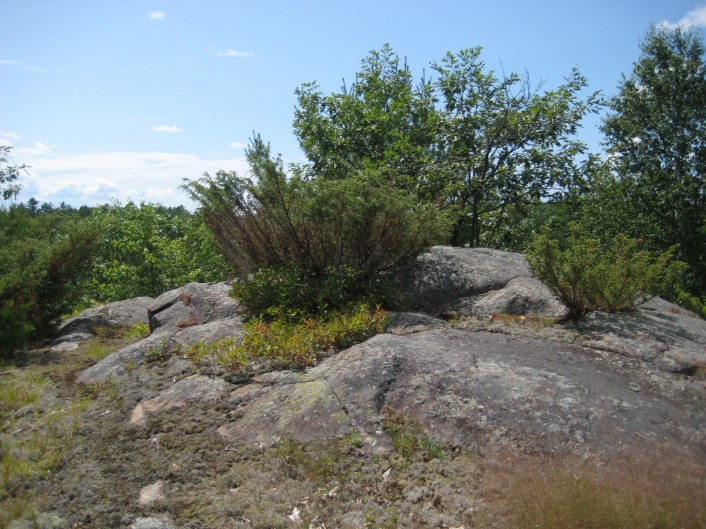A steep granite ridge runs along the edge of the Helen M. Butler Reserve, just west of Sparrow Lake.
The rugged terrain on this protected property shows the sheer force ancient glaciers had on the landscape.
Despite the open rock barrens and scattered forests and wetlands, this area provides food and shelter for a host of animal species. Black bears forage for grubs under rocks and rotten logs, moose and deer browse on the trees and shrubs, and reptiles such as the five-lined skink, Ontario’s only lizard, bask on the sun-drenched bare rock faces in the summer. The area is also home to the endangered eastern Massasauga rattlesnake. The reserve is part of the Severn River corridor, internationally known for its rare plants including Atlantic Coastal Plain Flora.
One of the most fascinating aspects of ecology is the intricate way in which individual species interact with their environment – their habitat – to meet its needs. For black bears, being an omnivore is a critical strategy for success; the ability to digest a wide variety of berries, vegetation, meat, and even small insects like ants allows a bear to make the most of opportunities throughout the warmer seasons. And bears have another useful adaptation – they ride out the winter season by hibernating, living off stored fat until warmer weather brings new food sources.
Other creatures of the Butler Reserve use much more specialized strategies. The colourful little wood warblers, for example, segregate the summer forest habitats to minimize competition. Blackburnian warblers feed high in the tree-tops; black-throated greens forage in the mid-levels, and chestnut-sided warblers usually stay in the lower branches. These insect-eaters make use of our abundant mosquitoes and black flies to feed their young, but then escape the cold by flying south. Some year-round birds such as chickadees switch to seeds for the winter, and can regulate their metabolism to help survive cold nights.
Set back from the Severn River, this 12 hectare (30acre) property was donated to the Couchiching Conservancy was donated in 2001 by the family of Ross Butler in his memory. The protection of this land was a long held dream for Ross. Together with surrounding Crown land, it will help to ensure that cottage country always has the wildlife that makes it so special.
The Helen M. Butler Reserve is located on Orimat Road, which is a private cottage road off the South Sparrow Lake Road. There is a small parking lot at the beginning of the road just outside the entrance gate. Visitors can park here and walk along the Orimat Road for about 4km to reach the Butler Reserve. The Roehl Wetland Reserve, another Conservancy property, is located on this road at the 2km mark.

